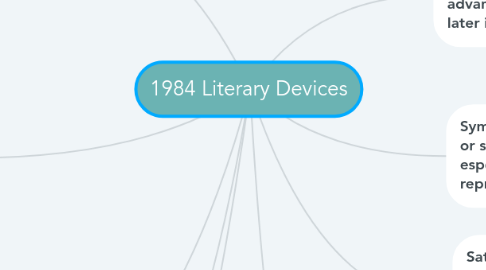
1. Paradox: A statement or proposition that, despite sound reasoning from acceptable premises, leads to a conclusion that seems senseless, logically unacceptable, or self-contradictory.
1.1. "WAR IS PEACE FREEDOM IS SLAVERY IGNORANCE IS STRENGTH" pg. 34
1.1.1. This is a paradox because of how contradicting each statement is. Each statement given by the society are literal opposites from each other, but are given to the people as if they are made to be truth. They are basically telling the people to go the opposite of their natural belief and trust in them only. This paint a picture for the totalitarian society depicted in the novel.
2. Irony: The expression of one's meaning by using language that normally signifies the opposite, typically for humorous or emphatic effect.
2.1. "Everything faded into mist. The past was erased, the erasure was forgotten, the lie became truth. Just once in his life he had possessed—AFTER the event: that was what counted—concrete, unmistakable evidence of an act of falsification." Pg. 95
2.1.1. The irony in this in "the lie became the truth". This symbolizes how the big brother takes every part of history pertaining to them and twists it into their own imaging, creating a "lie".
3. Flashback: A scene in a novel, set in a time earlier than the main story.
3.1. "Winston was dreaming of his mother." Pg. 37
3.1.1. The flashback depicts the animosities the society puts people through. Winston was taken away from his family as a child, and believed he was the one who killed his mother. When in actuality, his dream shows that his mother was killed by the society.
4. Simile: Is a comparison that uses words like, as, resembles, or that.
4.1. “But this was concrete evidence; it was a fragment of the abolished past, like a fossil bone which turns up in the wrong stratum and destroys a geo- logical theory.” Pg. 100
4.1.1. Was the moment when he realizes that his work was full of lies that the Party makes him do using the idea that was correct, but the truth is that they hide the history and the real information. This all happens because he remembers a piece of a newspaper well tells the truth of a new that now is changed.
5. Metaphor: Make a comparison between two things that aren't alike but do have something in common
5.1. “Even the streets leading up to its outer barriers were roamed by gorilla-faced guards in black uniforms, armed with jointed truncheons”Pg. 7
5.1.1. The ministry of love has a frightened structure and the persons that protect this place have really horrible and angry faces that produce in some cases security but in others fear. Is a contradictory but important part because it tells us how most things in this country are no coherence.
6. Foreshadowing: A literary device in which a writer gives an advance hint of what is to come later in the story.
6.1. “Already! He sat as still as a mouse, in the futile hope that whoever it was might go away after a single attempt. But no, the knocking was repeated. " Pg. 25
6.1.1. Before the knocking Wisdom was writing in the Diary “DOWN WITH THE BIG BROTHER” multiple times and at that moment this occurred he started imagining about who was behind the door and the most probably was the Thought Police.
7. Symbol: A thing that represents or stands for something else, especially a material object representing something abstract.
7.1. "It was one of those pictures which are so contrived that the eyes follow you about when you move. BIG BROTHER IS WATCHING YOU, the caption beneath it ran." Pg. 3
7.1.1. At the beginning of the story Orwell started describing the place where the story would take place and in these cases was a place dark where the only color was of the posters and are a symbol of the power that the Big Brother has and will always be superior to them, vigilating and manipulating them.
8. Satire: The use of humor, irony, exaggeration, or ridicule to expose and criticize people's stupidity or vices, particularly in the context of contemporary politics and other topical issues.
8.1. "You’re a traitor!’ yelled the boy. ‘You’re a thought-crimi- nal! You’re a Eurasian spy! I’ll shoot you, I’ll vaporize you, I’ll send you to the salt mines!’" Pg. 29
8.1.1. Before the knocking Wisdom was writing in the Diary “DOWN WITH THE BIG BROTHER” multiple times and at that moment this occurred he started imagining about who was behind the door and the most probably was the Thought Police.
9. Allusion: Is an indirect reference that is not described in detail. Is a passing message that the writer expect the reader to understand without explaining it.
9.1. “Always eyes were watching you and voices enveloping you. No escape nothing was what you, except some centimeters inside your skull” Pg. 34
9.1.1. Is a really interesting quote where the writer wants to make us understand without explaining it that the Party not only has the control of the citizens in a physical way, they also have it in an emotional manner; taking away their freedom turning them into slaves of the Party.
